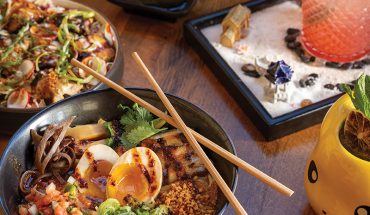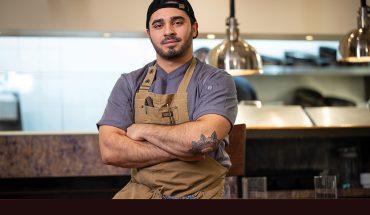
Guests dine at Second Empire Restaurant and Tavern in the restored Dodd-Hinsdale House in downtown Raleigh.
Raleigh restaurants that have stood the test of time
by Fanny Slater
photographs by Jill Knight
When I was 7, I asked my dad how the vacuum cleaner worked.
“Just like the light switches,” he said without looking up from a platter of mustard-painted salmon. “Magic.”
My mom happily supported this theory. Her head was often in another galaxy, but she also knew I had no legitimate interest in our Hoover’s air pressure or what made the room get brighter. I was a child guided by imagination, and my parents knew I would always prefer a state of “awe” over “oh.” Eventually I discovered light bulbs and realized they may have been pulling my leg on a few of those juvenile queries. One type of magic they did take very seriously, however, was food.
Our home was centered around scratch-made, epicurean cooking. As a result, we didn’t usually dine out. But when we did, we remained within a loyal rotation, a short list of establishments that nourished our appetites and our hearts. We had an unspoken bond with each beloved eatery as if it was a good friend. If it was my parents’ anniversary, for instance, my sister and I loosened our belts for Margaux’s profiteroles. If my mom had an appointment on Glenwood, a to-go bag with Neo-China’s shrimp and walnuts would soon grace our countertop. If my dad had a sore throat, I’d be off to Boondini’s for its hearty chicken-and-vegetable soup.
Enveloped in this familiar cuisine bubble for most of my young adulthood, I was completely unaware of how common it was for restaurants to turn over or to simply shut down. I assumed the establishments I loved would always be there for me. So far, so good.
Now that I know how rare it is for a restaurant to last, I decided to try to figure how they pull it off. What do my favorites do to survive in such a cutthroat industry? What’s the secret of their staying power?
With a fork in one hand and a pen in the other, I set out on a mission to uncover the magic at work behind some of Raleigh’s longest-lasting, most beloved restaurants. Turns out they share pride in what they do, an enthusiastic commitment to service and good food, a love of tradition, and a belief in consistentency.
Nina’s Ristorante
Have you ever tasted a dish that defies everything you thought you knew about food? The first time I savored a forkful of the elusive Eggplant Rollantini at Nina’s Ristorante, I slipped into an altered state of consciousness. I wondered: How in the world can something be so rich, yet so light at the same time?
I call Nina Psarros. “Can you call my house phone?” she asks. “I think there’s a hunk of Parmesan stuck in my cell and I can’t hear a thing.”
The irreverant Psarros launched her first endeavor, Da Nina’s, a wildly popular, four-star New York Italian eatery, in 1987. Lucky for those of us located a bit farther south, this firecracker and her loving husband Chris transported their garlic-infused aspirations to Raleigh in 1999, when they opened Nina’s Ristorante on Lead Mine Road. The place was a hit from day one.
Psarros has no professional culinary training, but she says her love for fine food began long before she became a successful restaurateur. “My mother gave birth to me in a Sicilian kitchen and all of the bread burned,” she says, laughing.
The authenticity of Nina’s food is one part of its secret. Its old-fashioned warmth and traditional setting is another. Burnt orange walls, brass chandeliers, sculptures, and a hillside mural set the scene.
One recent evening I found myself there, afloat in a sea of herby, unapologetically velvety Penne a la Vodka, with nothing to grab hold of but a slice of crusty bread dripping with finely chopped tomatoes and sharp balsamic. I’m not the only one who’s experienced an other-worldly meal in this spot. Most folks leave most restaurants by paying the bill. Here, nearly every patron exits with a hug and a kiss.
It has been that way from the beginning. Nina’s had been open a mere seven months when Psarros suffered an unthinkable tragedy: Her son and mother were killed in a car accident that also gravely injured Psarros and her father. She already had a community of generous, faithful customers who did everything under the Tuscan sun to nurse Nina’s family back to good health and spirits. “It was never about the almighty dollar anyway,” Psarros says, “and Raleigh suddenly became home.”
Several years later, Nina stepped down and handed it all over to two members of her team: Chef Vito Parisi and Tara Stockdale. After six years in Nina’s kitchen, Vito knew how to create the dishes customers had come to expect. “I focus on new creations like homemade pastas for specials,” Parisi says. “But I keep the menu the same for regulars.”
In three simple words, he pinpoints his secret: “I’m very happy.” Stockdale says she knew what she was taking on when she stepped into the pilot position. “It was important for Nina to give the restaurant to people who would keep the spirit of her and Chris alive.” Nina’s vivacious energy is no longer present in the dining room, but as Stockdale points out, “She’s not here, but she’s here.” You can still find Psarros at Positalia Italian Eatery in Wilmington and Brier Creek, where she is executive chef.
8801 Lead Mine Road; ninasrestaurant.com
Side Street Café
The only thing more delightful than the chicken salad at Oakwood’s Side Street Café is the owner herself. Mary Lu Wooten took over the former Corner Cupboard in 1979, a time when Raleigh’s dining scene consisted of a scant handful of choices. These days, historic Oakwood and its surrounding neighborhoods offer up fare of all kinds, but some things just don’t need fixing.
Raise your hand if you went to Peace College (when it was still Peace College) and counted on a Side Street sandwich to get you from class to class. And if I had a nickel for every time I scraped through the crevices of my car in search of loose change to pay for that extra cup of Side Street ranch dressing – well, I’d probably have more ranch. Even if your college days weren’t studded with satisfying memories of this café, it only takes one visit for it to stick. The simple menu – which showcases recipes from Wooten’s childhood, like outrageous pimento cheese – is full of playfully named lunch and dinner items. While the sides rule, Side Street’s homemade sandwiches and sweets are worth a detour. Want to know how the real regulars do it? Start with the bread pudding, and save your triple-decker clubhouse for dessert.
“It’s about service,” Wooten says, “not the almighty dollar.” (I’m seeing a pattern here.) In addition to a friendly, welcoming staff, Side Street has offered the same humble selections for decades. “We don’t complicate things,” Wooten says. She believes that the food should be recognizable, comforting, and elicit the same warm feeling you get when you come back home. Wooten does make it a point to accommodate individuals with dietary needs, and thanks to guests’ requests over the years (and a nod to nutrition), a few healthful dishes have made their way on to the menu. The fresh corn and bean salad, for instance, is so good it’s lick-the-plate worthy.
With such reliable, continued success, why not open another location? “Well, I wouldn’t be there when people come to visit!” Wooten exclaims. So unless she figures out how to be two places at once, you’ll have to swing through Oakwood to appreciate Side Street’s unique sparkle. 225 N. Bloodworth St.
Second Empire
Downtown Raleigh has seen a culinary boom in the past five years. From food trucks to brewpubs to local hot spots from James Beard award-winning chefs (lookin’ at you, A.C.), there’s no shortage of excellent places to eat. But Google the words “downtown Raleigh dining” and one restaurant shoots to the top of the list. Second Empire, currently approaching its 20th anniversary, has held strong as one of Raleigh’s most treasured culinary destinations. I speak as a lifer. From awkward teenage pre-prom meals to elegant grown-up celebrations, I’ve done a lot of fine dining within these historic walls.
The restaurant, housed in a historic residence, offers three different dining options. The main, formal dining room upstairs is tailor-made for fine dining and special occasions. The stylish downstairs tavern features lighter seasonal fare like the seafood paella with spicy chorizo, herbaceous local fish, and saffron-perfumed rice; it also offers the main dining room menu. Second Empire’s third option is glass-encased and romantic. “The atrium is our in-between,” owner Kim Reynolds says. “It’s on the tavern level, but thanks to white tablecloths, it’s not quite as casual.”

Original owners Ted and Peggy Reynolds can often be seen enjoying an early dinner together at the Second Empire Tavern bar.
When asked to break down the formula behind one of the city’s best-loved and most time-honored establishments, Reynolds has one word: consistency. “When it comes to a place that people treat like home, it’s important to assure them that nothing will change. We were mindful to accomplish this through the recession, and made it a point not to downsize portions or cut back on quality, service, and atmosphere.” Keeping this sturdy environment encouraged diners to create a special place in their hearts for Second Empire. Its harmonious rhythm never skips a beat.
Executive Chef Daniel Schurr says that operating a kitchen of Second Empire’s magnitude – and keeping it running like a well-oiled machine – is about one thing: “Consistency,” he says, “is the biggest driving force.” There’s that word again. Schurr emphasizes that his “eat with your eyes” technique is effective and motivates guests to return again and again.
Instead of relying on overly complex, fleeting trends (no pretentious foams or gases here), Schurr’s style is classic. “My influence is French, but now as an artist I focus on what inspires me – like the seasons,” he says. “Sometimes I’ll take a bike ride in nature and come back to the kitchen and create.”

Hard-boiled eggs have been offered at the tavern bar since Ted Reynolds saw them in New York years ago.
First-timers, Reynolds says, are often wooed by the history of the house. But it’s the first-rate cuisine and competent staff that make them return and spread the word. “We’re the place where you come for special occasions,” Schurr says, “and I’ll take that all day long.”
330 Hillsborough St.; second-empire.com
Neomonde
If I could swim in Neomonde’s hummus, I would. From the first sesame pita-smeared scoop of this righteously creamy spread, my family and I were hooked, and we’ve stocked it in our fridge for years. In case I didn’t make myself clear just now: holy hummus.
That’s not all this Middle Eastern restaurant, founded nearly 40 years ago by four Lebanese brothers, does well. Neomonde’s freshly made fare draws lines at mealtimes from a community of diehards who won’t go anywhere else for their tabouli, pita, fattoush, or kabobs. Or kibbeh. Or baklava. This is no quick-stop Shawarma shop.

Neomonde’s Chris Saleh, vice president of retail; Betty Saleh, research and development; Laura Saleh, catering director; and Charles Scott, Beryl Road general manager.
“We are constantly challenging ourselves to recreate ourselves,” says Sam Saleh, Neomonde’s president and one of the restaurant’s founding brothers. His family’s “fanatical” desire to provide a one-of-a-kind experience is another secret behind its prolonged existence, he says. The focus on being unique is particularly evident in its catering business. Laura Saleh, who runs the catering operation, says Neomonde’s untraditional event setup, with “intricate plating and buffet design,” makes Neomonde stand out.
The Saleh brothers also believe in modernizing and fine-tuning the business. “Our new iPad ordering and table tracking systems make it faster and easier to get to guests,” says Chris Saleh, who runs the retail and marketing division, and is a nephew of one of the founding brothers.
About the food. House favorites include the ever-so-silky, olive-topped hummus; tomato-flecked tabouli; and savory majadarah. Although neither my mom or I have ever been able to pronounce majadarah, that’s never stopped us from begging for “extra caramelized onions on the lentils, please.”
Neomonde also harbors a resourceful mindset, so you can find imaginative dishes like kale stems in a luscious lemon-tahini dressing. Sam Saleh’s wife Betty says the team is also proud to offer an expansive store selling specialty foods. “Having authentic Lebanese ingredients and Neomonde Bakery products in our market section is a great connection with our customers.”
The Saleh family’s own kitchen provides a benchmark for the quaility of the food they sell, they say. Their matriarch, Cecilia, they say, wouldn’t have had it any other way. Her original recipes form the basis for much of what the kitchen creates. “It’s literally like we moved our home kitchen to the restaurant,” says Chris Saleh, “and it’s been that way since my Grandma Cecilia and the brothers started in 1977.” Please pass the hummus!
3817 Beryl Road; neomonde.com











